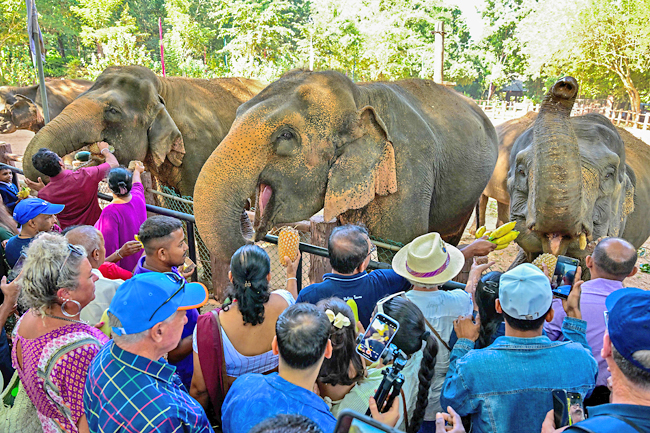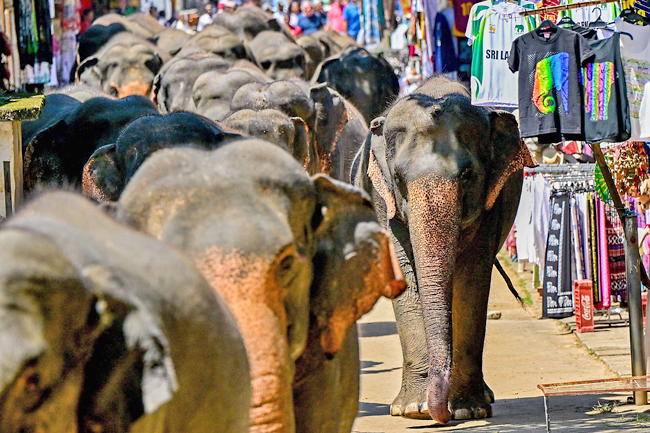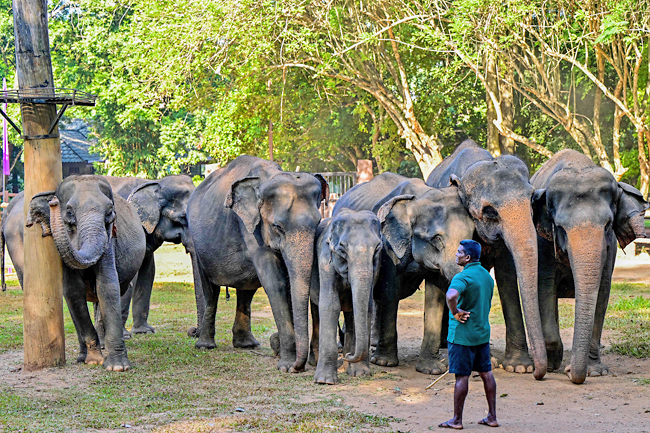PINNAWALA (AFP) – Sri Lanka’s main elephant orphanage marked its 50th anniversary on Sunday with a fruit feast for the 68 jumbos at the showpiece centre, reputedly the world’s first care home for destitute pachyderms.
The Pinnawala Elephant Orphanage lavished pineapples, bananas, melons and cucumbers on its residents to celebrate the anniversary of their home, which is a major tourist attraction.
A few officials and tourists invited to the low-key celebration were served milk rice and traditional sweets while four generations of elephants born in captivity frolicked in the nearby Maha Oya river.
“The first birth at this orphanage was in 1984, and since then, there have been a total of 76,” said chief curator Sanjaya Ratnayake, as the elephants returned from their daily river bath.
“This has been a successful breeding programme, and today we have four generations of elephants here, with the youngest 18 months old and the oldest 70 years,” he told AFP.
The orphanage recorded its first twin birth in August 2021 – a rarity among Asian elephants – and both calves are doing well.



Two years before the orphanage was formally established as a government institution in February 1975, five orphaned elephants were cared for at a smaller facility in the southern resort town of Bentota.
“Since the orphanage was set up at Pinnawala in 1975, in a coconut grove, the animals have had more space to roam, with good weather and plenty of food available in the surrounding area,” Ratnayake said.
The home requires 14,500 kilogrammes of coconut and palm tree leaves, along with other foliage, to satisfy the elephants’ voracious appetites.
It also buys tonnes of fruit and milk for the younger calves, who are adored by the foreign and local visitors to the orphanage, located about 90 kilometres east of the capital Colombo.
It is also a major revenue generator for the state, earning millions of dollars a year in entrance fees. Visitors can watch the elephants from a distance or get up close and help scrub them during bath times.
TRAGIC TOLL
The facility lacked running water and electricity at its inception but things improved as it gained international fame in subsequent years, said retired senior mahout K G Sumanabanda, 65.
“I was also fortunate to be present when we had the first birth in captivity,” Sumanabanda told AFP, visiting the home for the jubilee celebrations.
During his career spanning over three decades as a traditional elephant keeper, he trained more than 60 other mahouts and is still consulted by temples and individuals who own domesticated elephants.
Twenty years ago, Sri Lankan authorities opened another elephant home south of the island to care for orphaned, abandoned or injured elephants and later return them back to the wild.
While Pinnawala is seen by many as a success, Sri Lanka is also facing a major human-elephant conflict in areas bordering traditional wildlife sanctuaries.
Deputy Minister of Environment Anton Jayakody told AFP on Sunday that 450 elephants and 150 people were killed in clashes in 2023, continuing an alarming trend of fatalities in the human-elephant conflict. The previous year saw 433 elephants and 145 people were killed.
Killing or harming elephants is a criminal offence in Sri Lanka, which has an estimated 7,000 wild elephants and where jumbos are considered a national treasure.
But the massacre continues as desperate farmers face the brunt of elephants raiding their crops and destroying livelihoods.
The minister was confident the new government could tackle the problem by preventing elephants from crossing into villages.
“We are planning to introduce multiple barriers-these may include electric fences, trenches, or other deterrents-to make it more difficult for wild elephants to stray into villages,” Jayakody told AFP.





